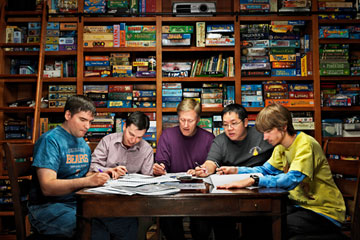
(7 of 7)
Since then, Snyder has left his biotech job, following a change in direction at ImmuMetrix. "At the WPC, the problems always have one solution and people generally agree with each other when they've found it," he writes in an e-mail. "In life, things are never as clean." He's launched his own company, Grandmaster Puzzles, which produces gloriously elegant, handcrafted puzzles, in contrast to the computer-generated puzzles that fill dozens of sudoku rags. Meanwhile, the World Puzzle Federation, which oversees the WPC, has started a Sudoku Grand Prix: eight tournaments, hosted by eight countries, all played online. The 2013 WPC has been set for next October in Beijing, and the rumor is that the sponsor, Beijing Media Network, is going to pump a lot of money into it. Maybe the Chinese will crack the TV problem and Team USA will be big in Asia.
Not that Team USA's members seem to care, particularly. What they care about is solving. No more than 10 minutes after the finals ended, Huang broke out a pack of cards, and the U.S. puzzlers started in on a four-handed Chinese card game called Tichu. It was 1:30 in the afternoon; they had time to kill before 3:00, which was the opening bell of an online sudoku tournament run out of Japan. First prize was a T-shirt (which Mebane would claim). In a way, elite puzzlers are like extreme big-wave surfers, endlessly chasing that pure logical high, the correct chain of reasoning that will lead them to the ultimate aha. But they're just like the rest of us too. All they really want are questions that have answers.
